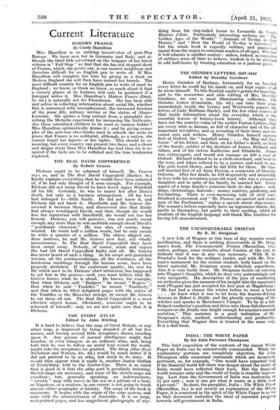THE REAL DAVID COPPERFIELD By Robert Graves
Dickens ought to be ashamed of himself. Mr. Craves says so, and in The Real David Copperfield (Barker, 9s.) kindly explains everything that he would have been ashamed of, if he had only thought of it soon enough. For example; Dickens did not mean David to have loved Agnes Wickfield all his life. Certainly, he was to marry her after Dora's death, but only as a business arrangement. All his love had belonged to—little Emily. He did not know it, and Dickens did not know it. Steerforth and Mr. Graves dis- covered it between them, and discovered also that Emily had always worshipped David, and that, though she would lose her reputation with Steerfortlt, she would not lose her honour. Dickens, you will perceive, was not nearly moral enough, any more than he was snobbish enough about David's " gentleman obsession." He was also, of course, long- winded. He wrote half a million words, but he only meant to write, a quarter of a million. The others, slipped out, from motives, he and Mr. Graves now fear, not wholly unmercenary. In The Real David Copperfield they have been swept away. Nobody, of course, reads and enjoys lie bad old David Copperfield faults and all. Mr. Graves has never heard of such a thing. In his swept and garnished Version, all the sentimentalizings, all the wordiness, all the boisterous ramblings through the human scene, have been properly abolished. If the exuberant quality, the zest for life which used to be Dickens' chief attraction, has happened to get lost in the process—well, you must believe that Mr. Graves knows what he is about. He knows, for example, that when Dickens said " Bodgers " he meant " Rogers " ; that when he said " Traddles he meant " Tradderly," and that when he filled delighted pages with the antics of the Traddles or the Micawber menage, he meant Mr. Graves 'to cut them all out. The Real David Copperfield is a most effective object lesson. Obviously, someone ought to be ashamed of himself : only we are not quite sure that it is Dickens.






































 Previous page
Previous page